Marlon Hargis - Exile
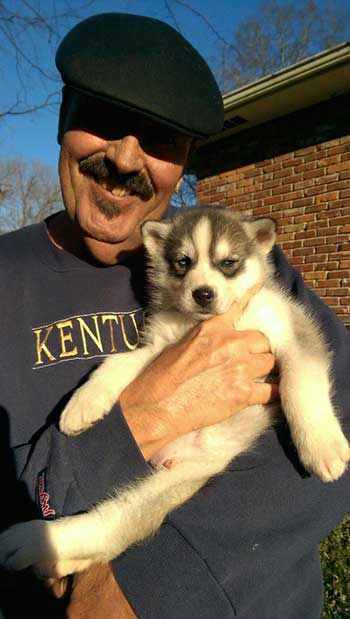 From the band Exile (Kiss You All Over), Marlon Hargis is our guest; and saying he loves our furry friends is an understatement. He even does a benefit concert for a homeless pets and people organization.
From the band Exile (Kiss You All Over), Marlon Hargis is our guest; and saying he loves our furry friends is an understatement. He even does a benefit concert for a homeless pets and people organization.
Exile has now been together for around 60 years. The members include Marlon Hargis, J.P. Pennington, Steve Goetzman, Sonny Lemaire and Les Taylor. They are still touring and are planning to do many concert dates this year.
It all started around 1966 when Marlon Hargis saw his future after seeing "The Exiles" on the Dick Clark Caravan of Stars concert in Lexington. They all grew up in the same part of Kentucky and kind of knew each other already as musicians. He remembers thinking what a cool band they were, never realizing he would be a member one day.
Five years later they asked him to join. At the time, Marlon was working in a club band making $400 a week, and when he started with Exile, the members were only making $75 a week. He states that back in the early 70's you could actually survive on $75 a week. While he took a big cut in pay, it obviously paid off, as he's still with them!
The band members of Exile are all HUGE animal lovers and every year they play a charity concert for SAFPAW, the Southern Alliance For People and Animal Welfare. SAFPAW is a non-profit organization helping the homeless community face the daily challenges of living in poverty with their pets. In addition their pet services help those housed but living at or below the poverty level. SAFPAW also serves as an active Homeless Outreach Organization. The local organization in Nashville helps homeless people with pets by providing food, spay and neuter surgeries, vaccinations and grooming.
Marlon tells us that his wife is also a volunteer at this small organization, and they will literally go out every day, no matter if it's zero or 100 degrees, and check on camps and tent cities to make sure that not only the people are okay, but the animals are too.
Marlon's wife not only volunteers with SAFPAW, she is also a groomer who donates her time. Marlon tells us of a story that happened with a 94-year-old woman who lived in a low-income home with her Poodle. He said that sometimes these animals are all these people have. SAFPAW picked the Poodle up and Marlon's wife groomed it. He explained that it didn't even look like a dog before and looked beautiful after she was done. Marlon said the animal was so happy and even seemed to be posing as if to say, "Man, I look good!"
 Upcoming Exile Tour Dates:
Upcoming Exile Tour Dates:
03/31/2023 - Chickasha, OK
04/01/2023 - Abilene, TX
05/12/2023 - Sugarcreek, OH
05/20/2023 - Hillsboro, IN
06/17/2023 - Maynardville, TN
08/03/2023 - West Allis, WI
09/16/2023 - Cowan, TN
09/30/2023 - Gail, TX
10/07/2023 - North Myrtle Beach, SC
Be sure to check them out when they are in your area!
At home, Marlon and his wife have 2 Siberian Huskies, 3 Chihuahuas and 3 cats. He claims that the alpha dog is actually one of the Chihuahuas, named Miko, who can back down the Siberian Huskies in a second! While the Chihuahuas sleep in bed with them, the Huskies are too large. However, they do think they are lap dogs and will get up in their laps as well.
View Website
Real Estate For Animal Businesses
Lynsey Polacheck, Inco Commercial
 You may already know how hard it is to find somewhere to live with your pets. That is especially true if you live in Los Angeles. LA is where Lynsey Polacheck runs her real estate business, Inco Commercial, for animal related businesses like groomers, pet hotels and even a doggy-shrink.
You may already know how hard it is to find somewhere to live with your pets. That is especially true if you live in Los Angeles. LA is where Lynsey Polacheck runs her real estate business, Inco Commercial, for animal related businesses like groomers, pet hotels and even a doggy-shrink.
Lynsey is located in Long Beach and it has been her job to learn the ins and outs of this business and this niche and states it is all worth it. She treats her clients like family and cares about them more than anything. Because of her niche, she works all over Orange and Los Angeles counties and doesn't always stay local. She works with brokers all over California as well brokers in other states as well. What she does can be done anywhere and we all know animals and animal businesses are everywhere!
There is a lot that goes into working with a city to get permits for pet businesses. While some places are pet friendly, you need to find those areas and then find a pet business landlord who will accept animals on their property. Just like with rentals, some pet businesses face other tenants who don't want them on the premises. Some people who start pet business, end up having to buy their own building if they want to have dog training on the premises.
Dog super stores, food stores and veterinary clinics are a lot easier to find because they don't have a lot of animals that are barking or using the premises for bathroom breaks.
Lynsey states the strangest business property she had to find was for a pet psychologist. The most difficult property to find was for someone in Santa Monica who wanted to start a pet hotel.
 Lynsey has had a love for animals and has owned them her entire life. She also loves real estate. Putting the two together has been a great joy for her, as we all know when we love what we do we do better at it!
Lynsey has had a love for animals and has owned them her entire life. She also loves real estate. Putting the two together has been a great joy for her, as we all know when we love what we do we do better at it!
INCO Commercial and its family of companies, INCO Municipal Consulting and CORE Property Management, provide local knowledge, regional reach and world-class service to our commercial real estate clients with three offices in Long Beach, Irvine and Riverside.
View Website
Kibble vs. Canned
Doc Halligan, Lucy Pet Foundation
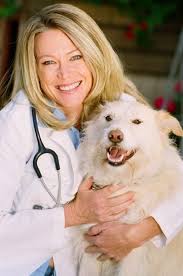 Doc Halligan is here to settle the age-old question, should we be feeding our pets dry food or from a can? The answer may depend on many factors. Also, is dry kibble responsible for one of the most common problems in older male cats?
Doc Halligan is here to settle the age-old question, should we be feeding our pets dry food or from a can? The answer may depend on many factors. Also, is dry kibble responsible for one of the most common problems in older male cats?
Three are currently three types of food to choose from. Canned food (68 to 80-percent water) is available in moist form and in individual portions. Semi-moist food (23 to 40-percent water) is available in individual portions or in bulk. Dry food (6 to 10-percent water) is available as kibble, meal, or expanded particles. The type of food you should feed your individual dog or cat depends on their age, their predisposition to dental disease and their lifestyle. Although the three food types are quite different in form, the biggest difference is in the amount of water content.
Canned food is 75-percent water, which is an essential nutrient, but the downside is that your pet has to eat more canned food to fulfill its nutrient requirements. Wet food has a low caloric density and higher packaging costs, so it's more expensive per calorie to feed. Depending on your pet, it can also lead to tartar buildup. Wet food is also the most palatable. Just open a can of wet dog or cat food and you'll see!
Semi-moist food, like canned food, tastes good, but it's not as messy and doesn't spoil as quickly. You don't need to refrigerate it after opening, and it usually comes in single serving sizes. The drawbacks are that it's usually high in sugar and preservatives and can contribute to dental disease in some animals.
Dry food has the lowest water content and is the most popular because of its convenience and its crunchy texture, which can help reduce the amount of dental disease in some pets. It has preservatives added to reduce spoiling, so it lasts the longest, and has a high caloric density, which means it's the most economical to feed.
However, dry food is unnatural for a cat to eat in the wild. Some cats might have more health problems, including problems with their urinary tracts eating only dry food, because they are not getting enough water. In the wild, cats don't drink a lot of water, as they eat things like mice, which are 70-percent water. However, domesticated cats that eat dry food are drinking lots of water to get it in their diet. So canned food is closer to what they would eat in the wild.
 Doc Halligan never recommends just feeding a cat dry food only. It should be at least 50/50 of wet and dry. However, there are some cats that Doc Halligan recommends canned food only for their diet.
Doc Halligan never recommends just feeding a cat dry food only. It should be at least 50/50 of wet and dry. However, there are some cats that Doc Halligan recommends canned food only for their diet.
But isn't canned food bad for your cat's teeth? Doc Halligan states that studies have been done that show it depends on the diet and how a cat eats. There are some cats that don't even chew their dry food, and literally inhale it.
Doc Halligan states that there are, however, some diets that do lead to more dental disease than others. These depend on their content of vitamins and nutrients as well as how much sugar the food contains. If there is a lot of sugar in the dry or wet food, you are going to get more build up of bacteria. So, it depends on the particular food.
 There are special diets made for pets to help clean their teeth, which have enzymes baked in them. However, you can't say that all dry food keeps your pet's teeth clean.
There are special diets made for pets to help clean their teeth, which have enzymes baked in them. However, you can't say that all dry food keeps your pet's teeth clean.
Can you save money by buying one food and feed your cat dog food or feed your dog cat food? Doc Halligan states that you should never feed a dog cat food and you should never feed a cat dog food. This is because the nutritional requirements are different for both cats and dogs.
Cats are obligate carnivores so they can't eat a vegetarian diet and they have higher protein requirements. Dogs are more like us and are omnivores.
What about free-feeding? Should you always keep a bowl full of food so they can eat whenever they want? Think about it, in the wild would they have access to food full time? No, they have to exert some effort and catch their food. So when do you think they exert that effort to go eat? When they're hungry. Do you ever see a fat animal in the wild? No. They are only motivated to look for food in he wild when they're hungry, not because they are bored. You see fat animals in captivity because they are eating for unnatural reasons, such as boredom.
Doc Halligan believes in twice-a-day feedings for several reasons. First, twice-daily feedings are better for digestion than one large meal and infrequent feeding leads to slow metabolism and even vomiting of bile from an empty stomach. Second, I think pets enjoy eating twice a day versus only once. They see us eating at least three meals, and by feeding them twice a day you'll resist the urge to feed them from the table, and your pet will be happier and healthier, and will live longer. The exception is if you have an ill or older pet that doesn't eat much and you want them to eat more frequently.
The Mission of The Lucy Pet Foundation is to reduce pet overpopulation by having mobile spay/neuter clinics across the country and to support causes that benefit animal welfare. The Lucy Pet Foundation currently has two buses that travel around Southern California focusing on spaying and neutering. These buses are state of the art surgery units. Their next focus is in generating more funds to expand the work of these buses and have more across the country.
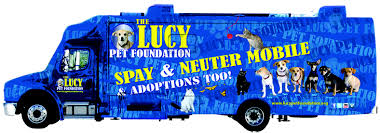 The Lucy Pet Foundation not only offers free and reduced spays and neuters, they also do microchipping, vaccines and de-wormings. Spaying and neutering is not only great for pet population control, but it has been proven that an animal will live on an average of 40-percent longer after having this surgery.
The Lucy Pet Foundation not only offers free and reduced spays and neuters, they also do microchipping, vaccines and de-wormings. Spaying and neutering is not only great for pet population control, but it has been proven that an animal will live on an average of 40-percent longer after having this surgery.
Visit Website
Prevent Pet Poisonings - Dr. Debbie
 March 19th through the 25th is Pet Poison Prevention Week, and an important time to look out for your pet's safety. As a veterinarian I see all types of pet toxicities, but it is through my own foolish Labrador's "toxic adventures" that I've experienced the anxiety and worry of a pet toxicity. My male Labrador, Magnum, once ate a full bottle of urinary continence medication, and another time suffered from the worst case of chocolate toxicity I've ever seen.
March 19th through the 25th is Pet Poison Prevention Week, and an important time to look out for your pet's safety. As a veterinarian I see all types of pet toxicities, but it is through my own foolish Labrador's "toxic adventures" that I've experienced the anxiety and worry of a pet toxicity. My male Labrador, Magnum, once ate a full bottle of urinary continence medication, and another time suffered from the worst case of chocolate toxicity I've ever seen.
Magnum loved to eat anything and everything. He didn't discriminate with his ingestions, and savored every type of animal excrement, ingested deceased rodents, gobbled on loaves of bread, destroyed jars of nuts, and slurped up rocks like Beggin-Strips. Learn from my experience, on both sides of the exam table and heed Dr. Debbie's "must know" tips to avoid pet poisonings.
Don't Underestimate Motivation
Pets are naturally curious and will knock items off counters, sniff out edibles and unearth household belongings all in the name of something interesting or tasty. Keep counters clear of food and medications. Eliminate opportunities for your pet to get into trouble in the first place.
And if you are the proud owner of a Labrador, as I am, you should know that the Labrador is the most common breed for toxicities. Labradors are very food motivated and poses a keen sense of smell - main reasons why this breed leads in emergency room visits.
Secure Human Medications
According to the ASPCA Animal Poison Control Center, the top toxicity in 2012 was from ingested human prescriptions. The main three culprits were heart medications (i.e. blood pressure meds), pain medications and antidepressants. Secure all human medications and avoid taking your medications with pets in the immediate area. Just one dropped pill can mean big problems for your cat or dog.
Know Dangerous Human Foods
Become informed on common human foods that are off-limits for your pets. A stick or two of sugar-free xylitol containing gum can kill your dog. Grapes, raisins, macadamia nuts, onions and chocolate are all toxic to animals.
Be Aware of Chewables
Chewable and flavored pet medications definitely make it simpler to administer our pet's medications, but are easily ingested in large quantities. Secure all human and pet chewable medications. Common pet chewable medications include arthritis medications, vitamins, supplements and heartworm preventatives.
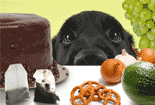 Take the Evidence
Take the Evidence
If your pet should suffer a toxic exposure, bring all suspect material. Your veterinarian needs to know what was ingested and the approximate time of ingestion. Don't make your veterinarian guess on these important details. Look for evidence of vomiting or diarrhea in the home. Bring any chewed medications, containers or vomitus.
Keep Emergency Numbers Handy
Know your veterinarian's daytime and after-hours emergency facility phone numbers. Not sure if you need to see the vet? Check out the ASPCA Animal Poison Control Center, a consultation service staffed by veterinary toxicologists to investigate your pet's toxic risk or call 1-888-426-4435. Consult fees apply.
Fortunately after decontamination, ICU time, and emergency care, silly Magnum came through just fine. But even with a cautious, watchful mom, he still has been able to rack up his share of emergency hospital visits in 11 years.
My best advice to any dog owner, is that no matter how well-behaved the pet or how prepared the owner, your pet is really just one gulp away from a toxicity. Besides, if it can happen to a vet's pet, it can happen in any pet household.
Featured veterinarian known as "Dr. Debbie" on national pet radio program, Animal Radio. Ebook author of "Yorkshire Terriers: How to Be Your Dog's Best Friend"; "Pugs: How to Be Your Dog's Best Friend"; "Mini Schnauzers: How to Be Your Dog's Best Friend"; and "Shih Tzu: How to Be Your Dog's Best Friend." Dr. Debbie's books.
Visit Website
The Dogfather's Grooming Tip with Joey Villani
 How To Get Rid Of That Fresh "Just Rolled In" Dead Smell
How To Get Rid Of That Fresh "Just Rolled In" Dead Smell
Perhaps you have one of those dogs that just loves to roll in dead things? We don't understand why they do it, but more importantly, we need to figure out how to get the smell off their coat.
Luckily, organic odors are pretty easy to remove, even though they are usually the worst smelling odors.
To remove that dead carcass smell, and we are not talking about skunk smell as there are better removal remedies for skunk odor, but for a dead carcass smell start with a gallon of water. This can be tap water, even though distilled water is best, and add 1/4 cup of anti-bacterial dish detergent. The reason you want anti-bacterial detergent is that if your dog is rolling around in other dead animals, who know what kinds of bacteria they are picking up. Next, add 1 cup of white vinegar and shake. The white vinegar will pretty much destroy the odor.
Take the mixture and spray it on your dog almost to a saturation point and work it in with a brush. When you are done, towel it off, and make sure your pet is dry before they go outside during the winter months. If it feels a little bit soapy, that is okay. The anti-bacterial soap is biodegradable and won't harm your dog. If you did this every day, then you should be concerned with the soap residue. But if your dogs are rolling in dead stuff every day, you've got other problems and need to clean your property! But, you can do this procedure every two weeks, or even once a week if you need to.
If you have any mixture left over, there is no shelf life to it and it will spoil. This means that what you don't use must be thrown out after about two hours, as the anti-bacterial properties are no longer working.
The Top Household Pet Poisons in Most Homes
Robert Semrow, Animal Radio Listomania
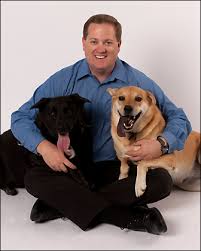 It's Robert Semrow, your pet world insider here with this week's Animal Radio Listomania. March is Poison Prevention Awareness Month and we here at Animal Radio try to share knowledge and care whenever we can. Many of these poisons can be found in most homes across the country. So, take a minute or 3 to identify if these items are in your home and if they are out of the reach of your beloved pets. If not, take some time today and get them put away safely. There is nothing more tragic than an illness or death that could have been prevented with just a little effort.
It's Robert Semrow, your pet world insider here with this week's Animal Radio Listomania. March is Poison Prevention Awareness Month and we here at Animal Radio try to share knowledge and care whenever we can. Many of these poisons can be found in most homes across the country. So, take a minute or 3 to identify if these items are in your home and if they are out of the reach of your beloved pets. If not, take some time today and get them put away safely. There is nothing more tragic than an illness or death that could have been prevented with just a little effort.
OK, enough pontificating; let's identify a few of these common dangers that can harm both dogs and cats.
Let's start with human and pet medications - Every year there are numerous horror stories about pets, dogs, cats, ferrets and other quick and curious pets getting in to serious health situations by ingesting human and pet medications not meant for them. It should go without saying, but keep any and all medications out of the reach of your two legged and four legged children. Your pets can't read the tiny labels on the bottles, so they don't know the kind of danger they are getting themselves in to.
Next - Household Cleaners. Just because it says all natural or green does not mean it is safe for your pets. If you are looking at the label for guidance, then you need to make sure it says "Pet Safe." There is a big difference between natural and environmentally safe and being pet safe. Keep this in mind when you are using household chemicals to clean. Your dogs, cats, birds, heck any pet that can encounter the areas that you are cleaning can get the chemicals on their feet or other parts and when self-grooming they can ingest these chemicals, which can severely harm them.
Rodenticides and pesticides - Again, your dogs and cats can be overcome by curiosity, especially after a rat or mouse has nibbled on the poison from one of these and it can lead to accidental poisoning of your pet. Be very vigilant of the traps and at least in the case of dogs, try to place them where a dog can't reach. Again, sprays and chemicals that may be used should state that they are pet safe or they shouldn't be used around your pets. Also, watch to make sure that these chemicals aren't finding their ways into areas that your pet likes to visit and recreate in.
 One more very common pet poison potential is from foods and alcohol that we enjoy and they can get access to. Alcohol is universally dangerous for our pets. Make sure you are not leaving this out where your pets can reach it. They do no know what it is and the unique smells may make it all that much more enticing to them. The same holds true for foods, things like onions, candy, gum, grapes and raisins can have severe consequences for your pets, so make sure that after you've enjoyed them, there aren't any left overs where your curious pet can get in to them.
One more very common pet poison potential is from foods and alcohol that we enjoy and they can get access to. Alcohol is universally dangerous for our pets. Make sure you are not leaving this out where your pets can reach it. They do no know what it is and the unique smells may make it all that much more enticing to them. The same holds true for foods, things like onions, candy, gum, grapes and raisins can have severe consequences for your pets, so make sure that after you've enjoyed them, there aren't any left overs where your curious pet can get in to them.
Remember our pets trust us implicitly and they are prone to want to explore our worlds and what we are doing. So if you are eating or drinking it, they assume they can to. Until we develop a pet poison warning system that pets can understand, it's our responsibility to remove and reduce the household risks to our pets.
Share your ideas on how to remove and reduce household risks on the Animal Radio Facebook Page.
Visit Website
Animal Radio News - Lori Brooks
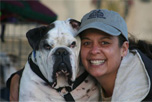 Horses Can Read Our Body Language
Horses Can Read Our Body Language
We've known about human body language for many years, but what about horses being able to read our body language? Research from the University of Sussex confirmed that horses can read facial expressions and that they can tell if a person is showing anger or happiness. The study looked at how 28 horses reacted to photographs of human facial expressions. Researchers said that when viewing pictures of angry human faces, horses looked more with their left eye, a behavior associated with perceiving negative stimuli, AND their heart rate also increased as they showed more stress-related behaviors. Keep an eye on your pet's eyes, because this is consistent with other research indicating that many animals view negative stimuli with their left eye because of the right brain's ability to process threatening events.
 Cat Has "Lucky" Eyebrows
Cat Has "Lucky" Eyebrows
There was a cat in Japan that become a popular attraction for tourists, because her distinctive eyebrows resembled the Japanese character for the lucky number 8. Hachi was born after the 2011 earthquake and tsunami that devastated Japan and was celebrated as a symbol of returning good fortune. She lived as a shop cat North of Tokyo and her "lucky" eyebrows were a national sensation because she was said to bring good luck to people who saw her and her two obvious black markings above her eyes. Hachi means 8 in Japanese.
Pair of Deformed Mountain Lions
Biologists at the National Park Service tracked a three-legged bobcat and her one-eared kitten after the pair was discovered in Southern California. They were spotted by camera traps in the Santa Monica Mountains and appeared to thrive despite their deformities. Bobcats catch live prey, so that meant she managed to hunt with one front leg - and did it well enough to feed herself and her kitten.
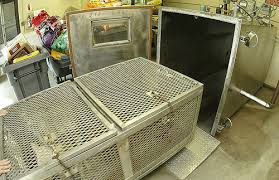 Gas Chambers Should Be Banned
Gas Chambers Should Be Banned
Gas chambers for humans were outlawed long ago, but not so for animals. Only around 22 states have banned the use of gas chambers for animals, while it is still legal to use them on animals in Arizona, California, Missouri and Wyoming. Consider the facts. It can take up to 30 minutes to kill a dog in a gas chamber while an injection can create loss of consciousness in 3 to 5 seconds. The animal stars of this movement to ban gas chambers include a cat named Andrea, who survived two attempts to gas her in Utah. Another survivor was a Beagle named Daniel whose story inspired Daniel's Law, which permanently banned the use of gas chambers in Pennsylvania. In Daniel's case, he was still alive after 17 minutes in the metal box filled with carbon monoxide. He somehow walked out of a gas chamber that killed 17 others at the same time. He became the poster dog for Eleventh Hour Rescue, a group dedicated to saving dogs from death row in high-kill shelters.
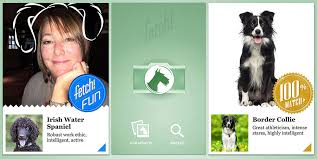 App Tells You What Kind of Dog You Are
App Tells You What Kind of Dog You Are
Microsoft has an application that allows you to upload a photo of yourself to determine what kind of dog you are. The Fetch app uses photos to identify and classify dogs while also describing their personality and matching them with photos of humans. Here's how it works: If you want to take photos of dogs, it will tell you what dog breed it is. But if you take a picture of a person, there's a fun mode that tells you what type of dog it thinks you are and why.
 Listen to the entire Podcast of this show (#1213)
Listen to the entire Podcast of this show (#1213)





